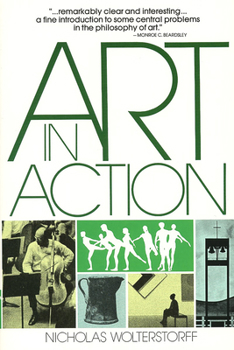Art in Action: Toward a Christian Aesthetic
Select Format
Select Condition 
Book Overview
Taking vigorous issue with the pervasive Western notion that the arts exist essentially for the purpose of aesthetic contemplation, Nicholas Wolterstorff proposes instead what he sees as an authentically Christian perspective: that art has a legitimate, even necessary, place in everyday life. While granting that galleries, theaters and concert halls serve a valid purpose, Wolterstorff argues that art should also be appreciated in action -- in private homes, in hotel lobbies, in factories and grocery stores, on main street. His conviction that art should be multifunction is basic to the author's views on art in the city (he regards most American cities as dehumanizing wastelands of aesthetic squalor, dominated by the demands of the automobile), and leads him to a helpful discussion of its role in worship and the church. Developing an aesthetic that is basically grounded, yet always sensitive to the human need for beauty, Wolterstorff make a brilliant contribution to understanding how art can serve to broaden and enrich our lives.
Format:Paperback
Language:English
ISBN:0802818161
ISBN13:9780802818164
Release Date:September 1987
Publisher:William B. Eerdmans Publishing Company
Length:250 Pages
Weight:0.70 lbs.
Dimensions:0.7" x 6.2" x 9.2"
Customer Reviews
1 rating
Maybe a brick but not the building
Published by Thriftbooks.com User , 18 years ago
I am a graduate student in the fine arts at a major university in the United States. I ordered this book with an eye on enriching my own theological reflection on the arts, an area that presently suffers from near pervasive theological negligence and fundamentalist reductive tendencies. Wolterstorff's "Art in Action" is commendable in so far as it offers careful analysis of and convincing argumentation against predominate contemporary Western views on the arts. This offering is additionally refreshing because Wolterstorff avoids the reactionary views of books with similar topics. This book advances an argument rooted in Christian narrative but driven largely by a philosophical engine that privileges rigorous analytic logic and careful scientific scrutiny. I see this as both the book's great strength and weakness. Wolterstorff spends an overwhelming majority of the book developing exacting analysis on what he rightly considers the narrowness of contemporary Western notions regarding the arts, with frequent discussions of analytic/scientific evidence regarding the arts and the nature of perception. Unfortunately, this privileging of analytic/scientific discourses significantly undermines the development of a prophetic, coherent narrative that distills a broader, more compelling Christian view of the arts in our lives. I make this criticism partly because Wolterstorff himself claims that this volume is meant to be the more accessible work of a set of philosophical reflections he has written on the arts. Those whose philosophical leanings run in the pragmatic/poststructuralist direction, or those whose theological narratives are indebted more to a Christ-story rather than a creation-story (Wolterstorff relies primarily on the latter), will find that the arguments of this book occasionally seem to miss the mark. Nevertheless, they will also find a cogent analysis and critique of contemporary Western notions of the arts as well as the messy birth of a Christian perspective for the arts.







